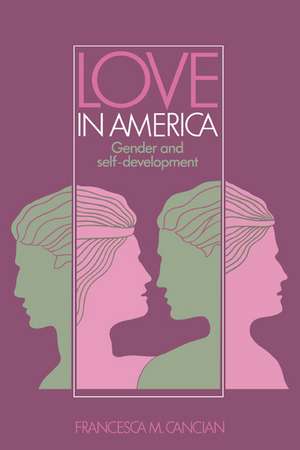Love in America: Gender and Self-Development
Autor Francesca M. Cancianen Limba Engleză Paperback – 30 aug 1990
| Toate formatele și edițiile | Preț | Express |
|---|---|---|
| Paperback (1) | 284.01 lei 6-8 săpt. | |
| Cambridge University Press – 30 aug 1990 | 284.01 lei 6-8 săpt. | |
| Hardback (1) | 689.59 lei 6-8 săpt. | |
| Cambridge University Press – 9 sep 1987 | 689.59 lei 6-8 săpt. |
Preț: 284.01 lei
Nou
Puncte Express: 426
Preț estimativ în valută:
54.35€ • 56.15$ • 45.23£
54.35€ • 56.15$ • 45.23£
Carte tipărită la comandă
Livrare economică 26 martie-09 aprilie
Preluare comenzi: 021 569.72.76
Specificații
ISBN-13: 9780521396912
ISBN-10: 0521396913
Pagini: 224
Ilustrații: 5 b/w illus. 4 tables
Dimensiuni: 152 x 228 x 11 mm
Greutate: 0.36 kg
Ediția:Reprint
Editura: Cambridge University Press
Colecția Cambridge University Press
Locul publicării:New York, United States
ISBN-10: 0521396913
Pagini: 224
Ilustrații: 5 b/w illus. 4 tables
Dimensiuni: 152 x 228 x 11 mm
Greutate: 0.36 kg
Ediția:Reprint
Editura: Cambridge University Press
Colecția Cambridge University Press
Locul publicării:New York, United States
Cuprins
List of figures and tables; Acknowledgments; Introduction; 1. Love vs. self-development; Part I. The History of Love: 2. The feminization of love in the nineteenth century; 3. From role to self: the emergence of androgynous love in the twentieth century; 4. The history of love: theories and debates; Part II. Feminized Love and Its Costs: 5. Feminine and masculine love; 6. Illness and split gender roles; 7. Martial conflict over intimacy; Part III. Androgynous Love: 8. Self-development through androgynous love; 9. Androgynous love in marriage; 10. Friends and relatives; Conclusion; 11. Current trends and future possibilities; Appendices; Notes; References; Index.
Recenzii
"Amid the plethora of scholarly and popular books on the current state of love, marriage, and community life in the United States, Francesca Cancian's Love in America stands out as a welcome and needed contribution. Drawing on survey findings, in-depth interviews, and content analysis of popular magazines, it offers an original account of the range of love relationships that has emerged in recent decades as women and men 'have gained considerable freedom in their personal lives'. The book also provides a well-reasoned and convincing rebuttal to the prevalent view that modern structural and cultural arrangements produce the disintegration of close, enduring personal bonds." American Journal of Sociology















